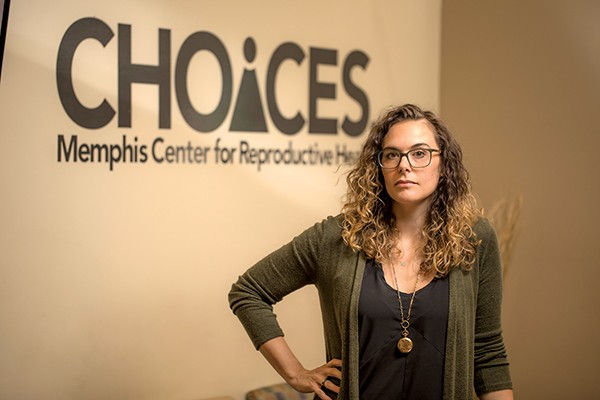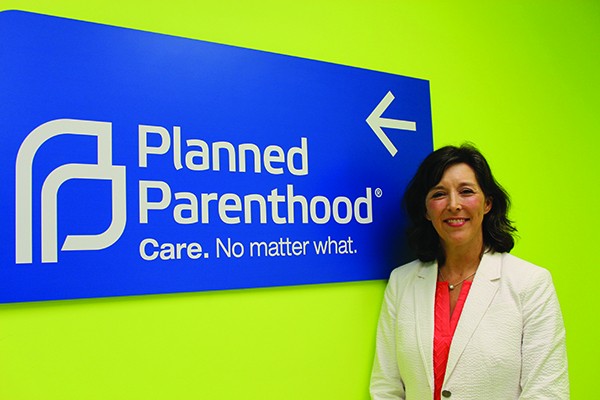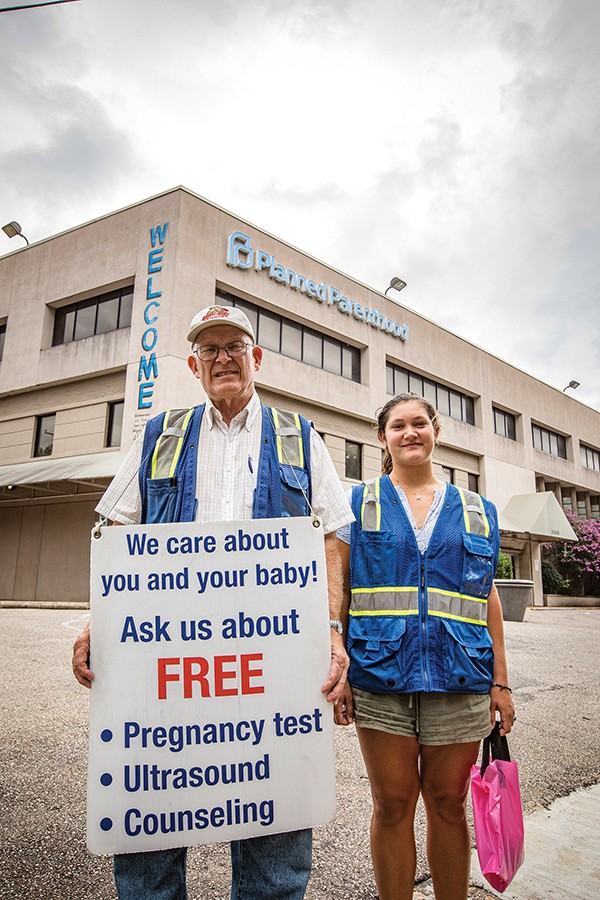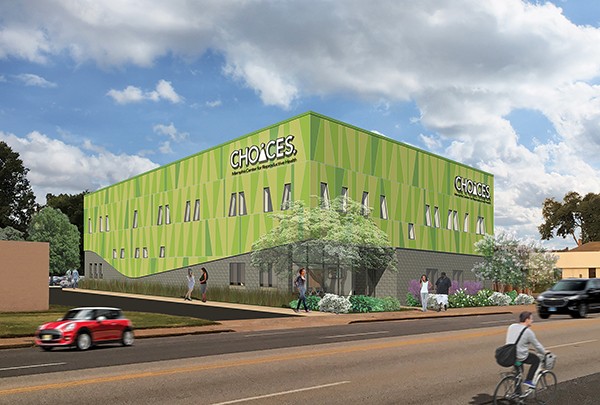If abortion had not been an option for former addict Ashley Howell when she unexpectedly got pregnant two years ago, she might have relapsed. She wasn’t in a good place and was not ready to have a child.
Her dad had recently passed away due to complications with alcoholism, she was in her last semester of college at the University of Memphis, and she was three years sober from alcohol, heroin, and meth.
Tennessee lawmakers are now pushing legislation that would have hindered Howell’s chances of getting a safe and legal abortion.
The Senate Judiciary Committee wrapped up hearings on that legislation, Tuesday, as the Flyer went to press. Legislators are seeking to ban abortion at the point a woman knows she is pregnant — essentially to completely ban abortions in the state.
The proposed legislation is an amended version of the so-called “heartbeat bill,” which nearly passed in the spring but stalled in the Senate. The Tennessee General Assembly did, however, pass an abortion trigger ban bill, which means if Roe v. Wade is overturned, abortion would be banned in the state.
 Justin Fox Burks
Justin Fox Burks
Ashley Howell (above) speaks about her experiences with pregnancy, abortion, and advocacy. At the time of her first pregnancy, it felt like a “me-or-the-baby question,” she says.
Me or the Baby?
If the heartbeat bill, also known as the six-week ban, had been in place two years ago, it would have been impossible for 30-year-old Howell to terminate her pregnancy when she did — at 12 weeks. When Howell found out she was pregnant, despite being on birth control, she had been dating her now-husband for three months. Howell was sure that “he was the one” and that she wanted to marry him and have a family with him. But not then; she wasn’t ready. “I wasn’t in a place to have a child then. I found out I was [pregnant] and freaked out.”
During her three months of pregnancy, Howell says she thought about using drugs every day. The urge had not been that relentless in her three years of sobriety until then. She and her then-boyfriend did eventually want to have a planned pregnancy. Because of Howell’s mental health and struggles with addiction, she wanted to get pregnant under medical supervision.
As she considered abortion, Howell felt like it was a “me-or-the-baby question,” and she chose herself — and to focus on her own health first.
“Evidently it was the right thing because I have no regrets,” she says. “Now I’m able to help other women who go through the same thing. That’s the beauty in it all.”
Howell says she often meets with women she’s met through recovery programs who are in similar positions as she was to offer advice and support. But she wasn’t always comfortable talking about her abortion. “I talk about my alcoholism all the time, and I’m very open with it,” Howell says. “But for some reason, I was ashamed of this.”
Then she heard about Patients to Advocates, a year-long program that brings together women who’ve had abortions. Meeting once a month for a year, the women learn about women’s rights, social justice, and how to become advocates for abortion rights to legislators. Through the program, Howell learned she “still had a lot of judgment toward myself.” Ultimately, she says, the program was vital to her healing.
Looking back, Howell says she’s convinced that if she would have had the baby two years ago, she would have relapsed. “If I use, I die. My addiction was very, very dark. I can’t imagine being in a place where I didn’t have the choice to choose abortion.” Howell says a place where the government would force a woman to do something she can’t or doesn’t want to “doesn’t feel like a free country. The right to choose what I do with my body just feels fundamental. It’s not a wild thing. In other countries it’s not up for debate. So why is it in the South?”

Ashley Coffield is CEO of Planned Parenthood Tennessee and North Mississippi.
Preparing for the Fight
Katy Leopard, assistant director of CHOICES: Memphis Center for Reproductive Health, says it’s a hard time to be a woman and have a daughter in the South. It’s also a hard time to be an abortion provider, she says.
“Being an abortion provider, every time the legislators are in session, my anxiety goes up,” Leopard says. “Everyone on the anti-choice side is emboldened and empowered. [President Donald] Trump’s rhetoric and the makeup of the Supreme Court make them feel powerful, so they are definitely willing to do a lot more than they were.”
Leopard says she never thought she would have to consider the possibility of Roe v. Wade being overturned, but that now she’s “very worried about it. We all should be.” But Leopard says CHOICES is preparing for whatever challenges lie ahead.
CHOICES, which was founded in 1974 as the first abortion provider in the city after the Roe v. Wade decision, is now one of nine nonprofits left in the country that perform abortions.
The framework for CHOICES that’s been used since its formation, Leopard says, is “if you give people information — scientifically based, factual information, that they will make the choices that are best for them, and all you have to do is support them.”
Over the last 10 to 15 years, Leopard says the organization began looking at other reproductive health-care needs not being met in the community. In addition to providing abortion care, the center now offers pre-natal care, fertility and birthing services, and wellness care to the transgender community and those living with HIV.
“There are issues around birth that people deserve choices for, too, and we should be able to do that,” Leopard says. “Today we do everything from fertility to birth and everything in between. If it has to do with your sexual, reproductive organs, we do it.”
In an effort to provide this more holistic approach, Leopard says CHOICES is opening a new, larger clinic in 2020. This means the services provided at the two current clinics on Bellevue and on Poplar will be offered under one roof. This will make CHOICES one of three centers in the country to provide abortions and birth in the same location and the first nonprofit in the country to do so.
“For us, it didn’t make sense to only be an abortion provider,” Leopard says. “It’s an unsafe thing to be, and it was a strategy of the anti-choice movement to carve abortion out and make it this weird thing that’s done in a house somewhere. It re-stigmatizes and supports the stereotype that abortion is some kind of odd, bad procedure. But it’s a part of women’s reproductive health care, and it belongs with all these other things that are about reproductive health.”
The new space will also allow CHOICES to see more patients, Leopard says. “We can’t see all the patients who would like to come see us in a timely manner because capacity is maxed out.”
The new model makes sense for patients, but it also makes sense legally, Leopard says. If legislation passes that places greater restrictions on or bans abortions here, the new all-encompassing model will allow CHOICES to remain open and perform its other services while it challenges the ban in court.
“If you want to be around to fight the fight, then you prepare,” she says. And CHOICES is preparing by building a comprehensive center. “We can’t do abortions? Fine. We’ll do all the other things while we take you to court.”
CHOICES is already challenging one law that puts a barrier between women and abortions — the 48-hour waiting period. The law requires women to have a physician visit 48 hours before she can receive an abortion. The law’s supporters say it’s meant to reduce coerced abortions and to allow time for women to carefully consider the information presented by the physician. Leopard calls it a “crazy barrier.”
Ashley Coffield, CEO of Planned Parenthood Tennessee and North Mississippi (PPTNM), agrees, saying that Tennessee is one of the worst states in the country in terms of barriers. She cites the 48-hour rule as a major contributor to this, calling it one of the “most onerous restrictions we have,” and noting that it places an extra burden on patients, particularly on low-income women.
“You have to take additional time off work, maybe another day of childcare; you have to travel to the health center twice,” Coffield says. “It’s just a lot, and it’s medically unnecessary.”
Along with CHOICES, Planned Parenthood of the Greater Memphis Region and of East and Middle Tennessee, as well as the Knoxville Center for Reproductive Health and Adams & Boyle, P.C. are plaintiffs in the lawsuit against Tennessee Attorney General Herbert Slatery and other state officials. The lawsuit, which argues that the waiting period “imposes significant burdens and offers no health benefits to abortion patients,” is set to go to court next month.
 Justin Fox Burks
Justin Fox Burks
Kent Pruett and Eliza Sims protest
“Last Support System”
Two girls wearing yellow traffic vests stand on the sidewalk in front of Planned Parenthood’s main office on Poplar. They offer purple goodie bags to those approaching the clinic’s entrance. Inside the bags are a box of Mike and Ike candy, a bottle of nail polish, a journal, and a brochure with “Women’s Care Network” written on the front. On the back of the brochure is a list titled “helpful resources,” including Christ Community Health Clinic, Birthright Memphis, and the Abortion Pill Reversal Hotline.
“We’re just here to support women,” one of the girls says, smiling and waving at those coming and going from the building.
The girls are just two of 25 volunteers with the Memphis Coalition for Life who participate in sidewalk advocacy aimed to steer women away from abortion. The coalition was formed in 2018 with the mission of ending abortion in Memphis “peacefully and prayerfully.”
Jessica Wade, founder and executive director of the organization, says the group aims to do that by connecting pregnant women with the resources they need to help them carry their pregnancies to term.
“We don’t picket, protest, or yell at women,” Wade says. “We’re just there to be that last support system and listening ear for them as they are about to make that decision. If they choose to take us up on that support, then we walk with them. If they choose not to, then we’re there. We’re still kind to them.”
Wade says she started the coalition because many women don’t realize the number of resources that are available to help with unplanned pregnancies. “They feel like that’s the only option, so we’re just there to offer them another option. If we really respect a woman’s right to choose, we’d want her to have all her options. I’m willing to sacrifice my nights and weekends so these women have the support that they need.”
Some of the support resources the coalition connects women with are pre-natal care, parenting classes, adoption services, and post-abortion counseling.
“Most of the women that we talk to who are considering abortion aren’t doing it because they hate babies and love abortion,” Wade says. “They’re doing it because they can’t pay their rent or their doctor bills and have a baby at the same time. But they don’t have to choose between a career and having a baby or going to school and having a baby. They can do both.”
Wade admits that the group’s mission of ending abortion in Memphis is a “lofty goal,” but she believes it’s possible. “If women felt like they had support … I don’t think nearly as many women would choose abortion if they knew there was help for them. I think even pro-choice advocates would say that if women had really strong support systems, they don’t necessarily need an abortion.”
If abortion does become illegal in Tennessee, Wade says it’s important that women are offered resources to support their pregnancies. “We’re not just telling her ‘Don’t have an abortion’ and leaving her in a crisis,” Wade says. “We want to empower women to choose life. I believe abortion is wrong and immoral, but I know that an unplanned pregnancy is scary and women need help. Abortion needs to end, but women need to be supported.”

State of Emergency
Coffield of PPTNM says Tennessee could be dangerously close to passing total-ban legislation next session that would make it nearly impossible for women to get abortions here. Abortion is currently legal in Tennessee up to the point of viability, which the Constitution cites at 24 weeks.
Coffield says the new legislation being heavily pushed by Senator Mark Pody (R-Lebanon) is a total abortion ban. It aims to redefine viability to the moment of conception, she says, and this type of legislation interferes with women’s personal and private decisions.
“We have a Supreme Court that puts Roe v. Wade at risk, and we have a state that is doing everything it can to eliminate the right and challenge women,” she says. “Politicians in Tennessee are out of touch with what people in Tennessee actually want them to be focusing on.”
Coffield says a total abortion ban is unconstitutional. “It’s an extreme and draconian measure. It’s being introduced by a group of privileged radicals that want nothing more than to hurt the health and well-being of women in Tennessee.” She also says the ban is “dangerous,” and it “threatens the lives of pregnant women.” When abortion is not an option, she says women and babies suffer.
“Physicians know that protecting women and children’s health requires giving them the option to terminate a pregnancy,” Coffield says. “Pregnancy is a medical diagnosis, and they should have all their options to decide if they want to continue with that or not.”
States with more abortion restrictions, tend to have poorer health outcomes for women and children, as well as a higher rate of infant and maternal mortality, Coffield notes.
A total ban would predominantly affect women who already experience disadvantages in health care, she says. These include young women, women of color, women with disabilities, undocumented women, as well as women living in low-income and rural areas.
“A total ban would put their lives in jeopardy,” she says. “And the state’s health and racial disparities are exacerbated by policies like this — ones that make it difficult or impossible to access a full range of reproductive services.”
Women of means can afford time off work and travel to other states to get an abortion, Coffield says. They also typically have better health care, which means they will know they are pregnant earlier and in time to legally terminate their pregnancy.
“If passed in Tennessee, the six-week abortion ban will be challenged in court,” Coffield said. “Just like every other state that’s passed similar laws, we would be setting Tennessee up for an expensive lawsuit that wastes hundreds of thousands of dollars in taxpayer money.”
Coffield says in other states that have passed six-week bans, including Kentucky, Mississippi, Iowa, North Dakota, and Ohio, the court has “easily blocked these bans,” on the basis that it is unconstitutional for states to prohibit a woman from choosing abortion before viability.
Still, she says “this is a state of emergency. In the 40-plus years since Roe v. Wade, there’s never been a more precarious time for women’s health. Abortion rights give women control over their bodies and their lives and without that, we’ll never be free or equal.”
Two Years After …
Two years after Ashley Howell decided to have an abortion, she’s expecting again and intends to carry her baby to term this time. She says she’s fully equipped, stable, and further along in her sobriety. She and her husband are ready now.
“It’s something I want, and it’s something I planned for,” Howell says. “I have a different perspective entirely. It’s such a lie that women who have abortions hate children.”